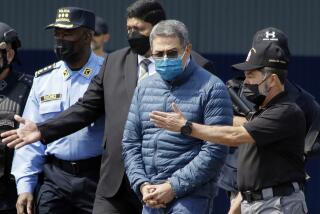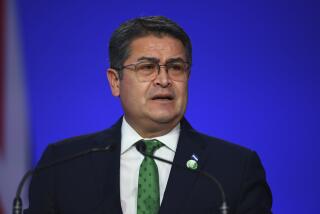Judge Throws the Book at ‘Miami Vice’ Drug Dealer
- Share via
Saying that “Miami vice” should not be imported here, a Los Angeles federal court judge Monday sentenced a Cuban immigrant--reputed to be one of South Florida’s major drug traffickers--to 25 years in prison and fined him $250,000.
U.S. District Judge Pamela Ann Rymer said she imposed the tough sentence on Carlos Quesada in order to send a message to other drug traffickers in Miami that they will be dealt with severely if they are arrested by federal drug agents in Southern California.
“From the moment of his arrival in this country (1963), he has been involved in one criminal enterprise after another,” Rymer said. “I’m obliged to send a signal to Miami. . . . Don’t do it; it’s not worth it. This community does not need the exporting of Miami vice.”
Rymer noted that Quesada boasted to authorities after his arrest last March that he made $3 million from trafficking cocaine. That claim prompted the judge to impose the fine, the maximum allowable under the law, she said.
Less Than Maximum Sentence
The sentence, however, was less than what federal prosecutors had asked for. Assistant U.S. Atty. James Chalfant had argued in favor of a 35-year prison term. Quesada, 43, who was convicted of one count of conspiracy to distribute cocaine, one count of manufacturing cocaine and three counts of possession with intent to distribute, faced a maximum sentence of 100 years in prison.
Federal authorities said Quesada had been involved in drug trafficking in Miami since 1969, but he escaped prosecution on several occasions because he was granted immunity from prosecution in exchange for testimony in several drug-related cases. His only conviction involving drugs resulted in three years’ probation in 1969, court records showed.
Because he acted as a police informant, Quesada began to flaunt his drug-trafficking business in the faces of Florida authorities, who were unsuccessful in their attempts to put him behind bars, Chalfant said.
“For one reason or another, either through cooperation or through the suppression of wiretap evidence, Quesada has managed to escape his just retribution for these activities,” a sentencing memorandum by Chalfant said. “The State Attorney’s Office in Florida has continually been frustrated in its attempts to rid that community of his presence.
“Quesada has evaded justice throughout their efforts, and has come to view the criminal justice system as a mere game to be won through manipulation.”
Harper’s Magazine Article
In a 1982 article in Harper’s magazine, attached to the sentencing memo, Quesada was described as a criminal who was eager to inform on his competitors in order to put them out of business.
One Miami police officer quoted in the article said that Quesada offered Rolex watches as bribes in order to prompt police action against other Miami drug traffickers.
Quesada and five others were arrested earlier this year after Los Angeles police seized 24 kilograms of cocaine marked for sale. According to testimony at Quesada’s trial, another 76 kilograms was awaiting delivery in Miami, and authorities said that Quesada had another 1,000 kilograms of cocaine waiting in Colombia for sale in the United States.
During the arrests, police discovered a cocaine-processing lab apparently set up by the drug ring headed by Quesada. It was the first cocaine lab ever found in Los Angeles, police said. The lab, according to federal drug agents, was part of an effort by Miami drug traffickers to move into Southern California.
Another Cuban immigrant convicted in the case, Pedro Tabares, 50, also of Miami, was sentenced Monday by Rymer to 12 years in prison.
More to Read
Sign up for Essential California
The most important California stories and recommendations in your inbox every morning.
You may occasionally receive promotional content from the Los Angeles Times.













